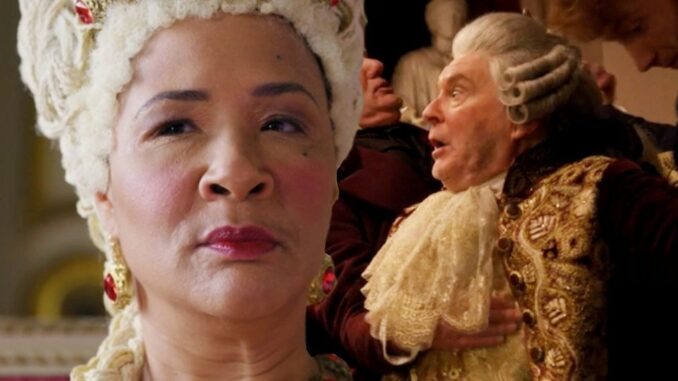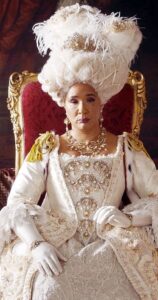
Bridgerton: Why The Queen Is Obsessed With The King’s Death
Throughout Netflix’s Bridgerton, Queen Charlotte asks whether her husband has died, but it’s out of love and pain rather than coldness that she asks.
Throughout the first season of Netflix’s wonderful Bridgerton, Queen Charlotte repeatedly asks whether her husband, the king, has died, a strange habit for someone who professes herself to be a fan of love. But the Queen’s strange obsession has a significant emotional weight behind it that speaks to the king’s mostly unseen tragedy and what it means for the Queen herself.

Bridgerton establishes Queen Charlotte (played magnificently by Golda Rosheuvel with haughty poise) as the head of her community, involved on an almost personal level with the dynamics of the ton and tuned closely to the various scandals. Given that she is essentially the ruling monarch, in her husband’s absence (though by this point in history, her son George IV was ruling as Prince Regent), the show establishes a matriarchy around her that is reinforced through various other character dynamics in season one. The great power players are Lady Whistledown, Lady Danbury, and Queen Charlotte, in real terms, with male characters generally presented as more emotional and easily “compromised”, even as society protects their interests.
But while her power and her position at the heart of debutante culture (she chooses the Incomparable each season, after all, and everyone seeks to curry favor with her) seem to suggest a coldness, the Queen is just as open to emotional displays and eventually reveals her own vulnerability. And her repeated requests to her waiting staff on whether her husband has died, whenever they bring her “news of the king” reflects that. She isn’t being cold or callous or calculating a change in her power, she is seeking confirmation of something she’s been mourning for years. She lost her husband when his health deteriorated and he was no longer the best friend she fell in love with.
The show fleetingly shows a reminder of what their relationship once was when King George III appears (played by Four Weddings & A Funeral’s James Fleet) cameos, appearing lucid. Queen Charlotte’s surprise is tangible, because George III had, by 1813 when the show is set, been too unwell to rule for 3 years, with modern thinking suggesting he had severe bipolar disease and psychosis. And unlike history, which remembers George III for his so-called “madness” and what it meant to Britain’s relationship with America, Bridgerton shows the cost of a debilitating psychiatric condition that robs a wife of her lover and husband. That he’s hidden away speaks also to the same culture of tragic shame that meant Simon Bassett was almost banished for his stammer: any sign of imperfection would be a weakness and Bridgerton’s world is all about the value of appearances.

The Queen’s consideration of whether her husband is dead is loaded with both emotions: the societally pressured shame associated with his illness and what people would say about him and the monarchy, and the pain of having lost her true love. Charlotte and George’s marriage was one of love, which in Bridgerton’s alternate universe was one that broke down the boundaries of race (and created a more progressive and equal Regency society – at least in terms of race), which is why the Queen can be so easily convinced to ratify the marriage of Simon and Daphne. She sees in them the same love she has lost when her husband no longer recognises her. She mourns him already, but repeatedly asking about whether he has died is her waiting for the torment – for both of them – to be ended because seeing what has become of her love is too much for her. That that real emotion is wrapped up in what society expects a king or a queen to be adds another tragic element entirely.